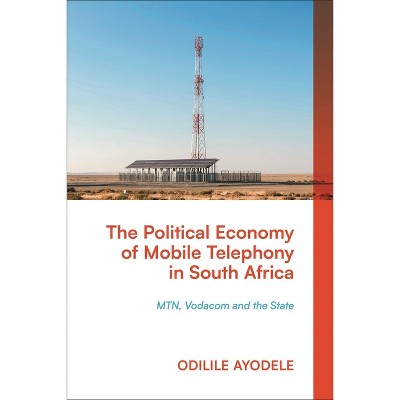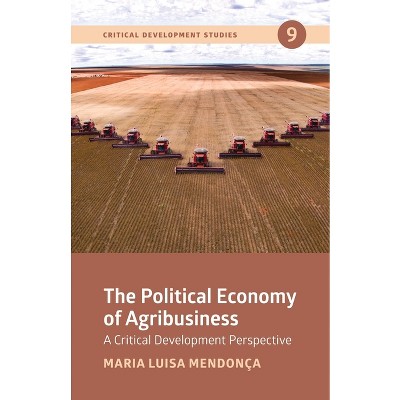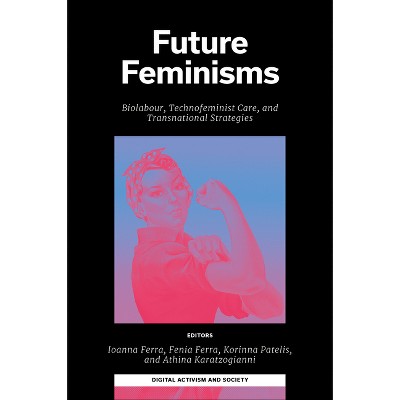Organizing Women Workers in the Informal Economy - (Feminisms and Development) by Naila Kabeer & Ratna Sudarshan & Kirsty Milward (Paperback)

About this item
Highlights
- Women as a group have often been divided by a number of intersecting inequalities: class, race, ethnicity, caste.
- About the Author: Naila Kabeer is Professor of Development Studies at the School of Oriental and African Studies, London University.
- 312 Pages
- Political Science, Political Economy
- Series Name: Feminisms and Development
Description
Book Synopsis
Women as a group have often been divided by a number of intersecting inequalities: class, race, ethnicity, caste. As individuals - often isolated in reproductive or other home-based work - their weapons of resistance have tended to be restricted to the traditional weapons of the weak: hidden subversions and individualised struggles.
Organizing Women Workers in the Informal Economy explores the emergence of an alternative repertoire among women working in the growing informal sectors of the global South: the weapons of organization and mobilization. This crucial book offers vibrant accounts of how women working as farm workers, sex workers, domestic workers, waste pickers, fisheries workers and migrant factory workers have organized for collective action. What gives these precarious workers the impetus and courage to take up these steps? What resources do they draw on in order to transcend their structurally disadvantaged position within the economy? And what continues to hamper their efforts to gain social recognition for themselves as women, as workers and as citizens? With first-hand accounts from authors closely involved in emerging organizations, this collection documents how women workers have come together to carve out new identities for themselves, define what matters to them, and develop collective strategies of resistance and struggle.Review Quotes
"While acknowledging the organisational challenges faced and overcome, the essays in this important book mount a concerted challenge to the popular notion that certain kinds of informal workers are too isolated and invisible to be organised successfully. A must read for all looking to understand the organisational strategies which transform powerless labourers into worker citizens." --Dzodzi Tsikata, University of Ghana
"Women are exerting themselves across the world in wonderful ways. This is about more than combating vulnerability and oppression, although that is important enough. It is also about forging ways of living in which the human condition is enhanced. Women's organisations are reviving a sense of solidarity and rescuing the meaning of equality, while giving new meaning to the ethos of freedom. This book speaks to that agenda, and should be widely read." --Guy Standing, SOAS "While many talk about women's empowerment, this book offers concrete and inspiring examples of how it is done! The lessons and insights from these cases are relevant to all of those concerned with how to build "people power" from the bottom-up in a global world." --John Gaventa, University of Sussex "This book gets to the heart of the development challenge: by focusing on women workers, the informal economy, and organizing. With an insightful overview by the editors, illustrative case studies from several countries and an inspiring endnote by Ela Bhatt, founder of the Self-Employed Women's Association, the largest organization of women workers in the informal economy, this book is a must for anyone interested in the power of organization and the intersection of employment, poverty, and gender." --Marty Chen, Harvard Kennedy SchoolAbout the Author
Naila Kabeer is Professor of Development Studies at the School of Oriental and African Studies, London University. She has extensive experience in research, teaching and advisory work on gender, poverty, labour markets, livelihoods, social protection and grassroots citizenship. Her publications include Reversed Realities: Gender hierarchies in Development Thought; The Power to Choose: Bangladeshi Women and Labour Market Decisions in London and Dhaka; and more recently, Gender and Social Protection in the Informal Economy. She has also edited a number of books, including Inclusive Citizenship: Meanings and Expressions and Institutions, Relations and Outcomes: Methodologies for Planning and Case Studies from the Indian Context, both published by Zed Books.
Ratna Sudarshan is Advisor (Research and Projects) at the Institute of Social Studies Trust, New Delhi, where she was Director from 2003 to 2011. She has researched and published on women in the informal economy, with a special focus on home-based work, social protection and local economic development; gender and education; research and policy linkage; and gender and evaluation. Other recent publications include a co-edited special issue (on 'Evaluating gender and equity') of the Indian Journal of Gender Studies, 19, 2 (June 2012). Kirsty Milward founded and co-manages Suchana Uttor Chandipur Society, an organization offering education focused on social and gender equality amongst the Adivasi communities where she lives in West Bengal, India. She is also a freelance consultant providing writing, editing and evaluation services and specializing in gender and rural development. She has a particular interest in various organizational formations inspiring action to advance social and economic equality. Kirsty has an MA in gender and development from the Institute of Development Studies, University of Sussex.Naila Kabeer is Professor of Development Studies at the School of Oriental and African Studies, London University. She has extensive experience in research, teaching and advisory work on gender, poverty, labour markets, livelihoods, social protection and grassroots citizenship. Her publications include Reversed Realities: Gender hierarchies in Development Thought; The Power to Choose: Bangladeshi Women and Labour Market Decisions in London and Dhaka; and more recently, Gender and Social Protection in the Informal Economy. She has also edited a number of books, including Inclusive Citizenship: Meanings and Expressions and Institutions, Relations and Outcomes: Methodologies for Planning and Case Studies from the Indian Context, both published by Zed Books. Ratna Sudarshan is Advisor (Research and Projects) at the Institute of Social Studies Trust, New Delhi, where she was Director from 2003 to 2011. She has researched and published on women in the informal economy, with a special focus on home-based work, social protection and local economic development; gender and education; research and policy linkage; and gender and evaluation. Other recent publications include a co-edited special issue (on 'Evaluating gender and equity') of the Indian Journal of Gender Studies, 19, 2 (June 2012). Kirsty Milward founded and co-manages Suchana Uttor Chandipur Society, an organization offering education focused on social and gender equality amongst the Adivasi communities where she lives in West Bengal, India. She is also a freelance consultant providing writing, editing and evaluation services and specializing in gender and rural development. She has a particular interest in various organizational formations inspiring action to advance social and economic equality. Kirsty has an MA in gender and development from the Institute of Development Studies, University of Sussex.











